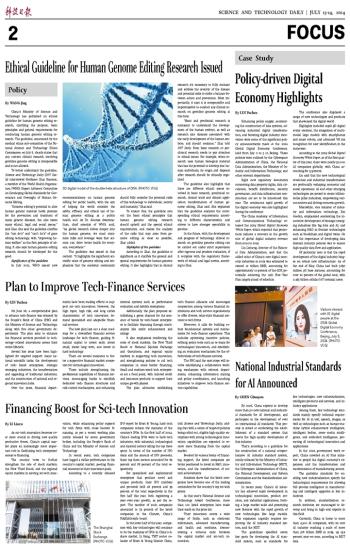
 |
| 3D digital model of the double-helix structure of DNA. (PHOTO: VCG) |
China's Ministry of Science and Technology has published an ethical guideline for human genome editing research, clarifying the purpose, basic principles and general requirements for conducting human genome editing research. The guideline, announced by the medical ethics sub-committee of the National Science and Technology Ethics Commission on July 8, clearly states that any current clinical research involving germline genome editing is irresponsible and is not allowed.
To better understand the guideline, Science and Technology Daily (S&T Daily) interviewed Professor Zhai Xiaomei, a member of the World Health Organization (WHO) Expert Advisory Committee on Developing Global Standards for Governance and Oversight of Human Genome Editing.
"Genome editing's potential to alter human genetic material holds promise for the prevention and treatment of many genetic diseases, but also raises many ethical, legal and social issues," said Zhai. She said the guideline clarifies the "can do's" and "can't do's" of gene editing technology, with "improving human welfare" as the first principle of editing. It also says human genome editing research should be developed for the good.
Significance of the guideline
In July 2021, WHO issued new recommendations on human genome editing for public health, with the aim of helping the world consider the safety, efficacy, and ethical use of human genome editing as a public health tool. As Dr. Soumya Swaminathan, chief scientist of WHO, said, "As global research delves deeper into the human genome, we must minimize risks and leverage ways that science can drive better health for everyone, everywhere."
The guideline was issued in this context. "It highlights the significant scientific value of genome editing and emphasizes that the academic community should fully consider the potential risks of this technology to individuals, society and humanity," Zhai said.
To ensure this, the guideline sets out the basic ethical principles that human genome editing research should uphold and the special ethical requirements, and makes the analysis of the risks that may arise from genome editing as clear as possible, Zhai added.
Highlights of the guideline
According to Zhai, the guideline is significant as it clarifies the general and special requirements for human genome editing. It also highlights that in clinical research it's necessary to fully evaluate and address the severity of the disease and potential risks to strike a balance between action and prevention. Most importantly, it says it is irresponsible and impermissible to conduct any clinical research on germline genome editing at this time.
"Basic and preclinical research is necessary to understand the development of the human embryo, as well as research into diseases associated with the early development of the human embryo, and should continue," Zhai told S&T Daily. Even basic research or preclinical research needs to pay attention to ethical issues. For example, when research uses human biological material that has the potential to develop into human individuals, its origin and disposal after research should be ethically regulated.
The guideline also highlights that there are different ethical issues involved in basic research, preclinical research, clinical trials and clinical application transformation of human genome editing, Zhai said. She explained that the guideline analyzes the corresponding ethical requirements according to different characteristics, and strives to have stronger operability in practice.
In the future, with the development and progress of technology, clinical research on germline genome editing can be carried out under strict supervision after rigorous and prudent evaluation, if it complies with the regulatory framework of ethical and legal norms, according to Zhai.


 Next
Next




